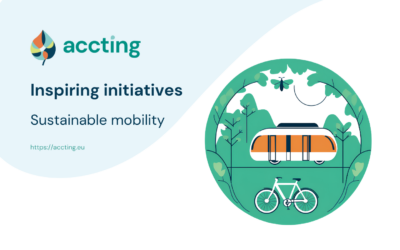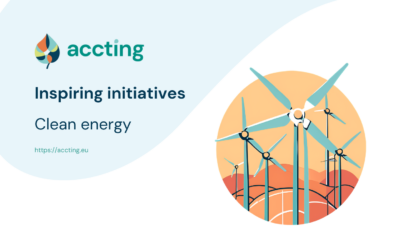This article is part of a three-part series focusing on the successes, challenges and lessons learnt from ACCTING’s pilot projects.
Three years ago, the ACCTING project set out to explore how to make the European Green Deal more inclusive and just, especially for communities often left behind. Alongside research activities, ten pilot projects across Europe were funded. The context in which pilots were implemented however vary greatly – this includes the sectoral (from fire resilience to cycling) and geographic context (from rural Zagori to urban Palermo), as well as the primary target group (from Roma communities to disadvantaged youth). Nevertheless, there is a range of shared successes, challenges and obstacles as well as general lessons learnt that can be identified as cross-cutting.
What were the challenges that pilots faced?
Challenge #1 Lack of secure / formal funding mechanisms
Arguably the greatest challenge was the lack of long-term funding for the work of the pilots, making it difficult for them to plan or commit to medium- to long-term actions. Given the fixed, one-year nature of the ACCTING funding, the ACCTING project team were repeatedly approached by the pilots, asking about possibilities for further ACCTING funding or knowledge of other funding opportunities. It is clear that this is part of a pattern of ad-hoc, short-term funding, which likely contributes to the high turnover rate of personnel and indeed CSOs themselves (see Challenge #7). Indeed, not all organisations involved in the ACCTING pilots will necessarily be able to continue running in and beyond 2025.
Regarding the specific work of the pilots for instance, Dialogue & Action Against Wildfires noted in its final report that despite clear plans to continue the pilot work, that it has not yet secured any formal funding mechanism that would guarantee ongoing support for work such as training, equipment upgrades, or scenario-refinement exercises. Food4Schools noted similar difficulties in relation to its work on sustainable food in Greek schools.
Challenge #2 Financial constraints excluding certain demographics
The funding constraints mentioned above have implications not only on the sustainability but also on the inclusivity of the initiatives. For instance, some initiatives, like the Urban Gardens in Mapko have to collect a membership fee for their functioning, which serves as an access barrier for participation of lower income groups. Similarly, many initiatives cannot pay compensation for engagement of participants, which similarly serves as a barrier for deeper engagement.
Challenge #3 Ensuring equitable distribution of benefits and recognition
Regarding the tangible benefits discussed, such as infrastructure, equipment, and awards (see Success #6), equitable distribution and clear explanation of criteria is essential, with a number of pilots noting tensions in this regard. EduMove noting frustration by participants as regards to sub-par and/or differing quality of the bicycles donated.
In the case of Supporting Roma micro-entrepreneurs in Albania towards better environmental sustainability, they noted that vulnerability is not a self-evident concept, and the criteria for who qualifies as “vulnerable” was challenging during the implementation of project activities. This is also the case in relation to awards and prize ceremonies to recognise good work. Again, the selection process can lead to similar disagreements and perceived bias from those not selected.
Challenge #4 Difficulty obtaining government permission
While a few pilots had success engaging municipal actors (see Success #7), many faced significant delays or lack of responses from government actors at various levels. This often significantly held up their ability to progress with their planned projects.
While Mapko was able to conduct their own project work of mapping and supporting community gardens, they noted that many gardens struggle to secure operational permissions from municipalities, and others even face displacement due to land being repurposed for other projects (e.g. real estate development).
EduMove noted challenges to receive approval to conduct bicycle riding and safety training in schools. While they had good relationships with the local municipality, the school curriculum is the responsibility of the Ministry of Education. They note that while videos and other materials can be produced and delivered to school libraries, they risk gathering dust unless actively included in curricula. Thus, “The key to making this initiative successful is to create a clear structure, training schedules, and ensuring ongoing access to the materials.”
Todas en bici’s work to advocate for a safer and more inclusive cycling city for all Barcelona residents ran into difficulties engaging the municipality with a variety of policy proposals. With no clear contact within the municipality, plans to influence the city’s plans and infrastructure development were stillborn. This is clearly more crucial for some topics (e.g. cycling), where infrastructure and other top-down support is so necessary for influencing long-term outcomes.
InclusivECs awards similarly noted that the competencies for regulation of energy communities are shared across three levels of government – local town councils, regional state actors (the autonomous community) and the central government. While support was obtained from the former, lack of dialogue with the latter two created challenges. Better multi-level governance is required.
At other times, even where (local) governments wished to support, capacity issues sometimes arose. Thus, for instance, Food4Schools noted that pressing professional commitments and time constraints created difficulties in engaging local policy-makers who might otherwise have participated more actively.
Challenge #5 Top-down administrative culture
In the process of seeking institutional support for their work, some PAs noted difficulties with hierarchical, top-down administrative cultures. While Dialogue & Action Against Wildfires had some success working with their municipality of Messina, they noted challenges for multiplication across Greece owing to the “top-down administrative culture of most regions in Greece and may slow the adoption of bottom-up planning.”
This unwillingness to give up centralised control can sometimes make it hard for “outsiders” looking to support the work of public actors. Thus, for instance Food4Schools work on sustainable food procurement was made challenging from the start by a lack of consistent documentation on how this is dealt with in the Greek context, compounded by a very low response rate from ministries and regional authorities on requests for information. This required additional unexpected research work – the third part of the project’s final research report.
Challenge #6 CSO time-constraints
Many pilots worked to tailor support and/or project outputs to specific geographical contexts or (vulnerable) target groups. Here it was noted that any work to this effect was enormously time-consuming. Supporting Roma micro-entrepreneurs in Albania for instance, had challenges tailoring their business support and tools to vulnerable Roma micro-entrepreneurs, especially owing to the beneficiaries’ limited experience with formal business planning.
Challenge #7 Lack of personnel continuity
Finally, as repeatedly hinted at, changes in leadership create substantial challenges for CSOs. Thus, for instance, EduMove noted that any work and communication with schools and students depends entirely on the subjective personal engagement and reliability of the contact point at that particular school.
Mapko in particular noted a trend of leaders in community gardens moving or reducing engagement for personal reasons after around three years of involvement, substantially impacting long-term project goals, community cohesion, and the kinds of fruitful personal relationships previously discussed. They cite a number of specific policy recommendations in Section 4 of the report to overcome this (in addition to the need to simply provide more funding for CSOs).
This article is part of a three-part series focusing on the successes, challenges and lessons learnt from ACCTING’s pilot projects.


